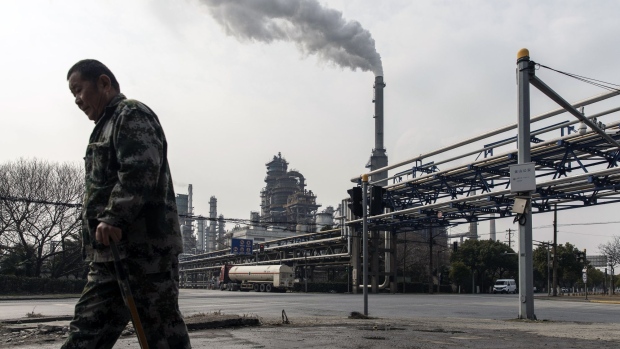Mar 6, 2022
China’s Policy Show Offers Little to Cheer on Climate Progress
, Bloomberg News

(Bloomberg) -- There wasn’t much new for climate watchers to celebrate at the start of China’s annual policy meeting, as Beijing staked out a flexible energy policy that won’t hinder its efforts to spur economic growth.
In work reports released at the opening of the National People’s Congress in Beijing on Saturday, the government opted not to set a yearly target for reducing energy consumption per unit of GDP, its usual metric for charting its climate performance. Instead, it sought “appropriate flexibility” as it seeks to balance its carbon goals with the needs of an economy that has stuttered since the summer.
And in comments on Sunday, President Xi Jinping repeated his refrain that cutting emissions shouldn’t come at the expense of energy and food security, supply chains, or the normal life and work of the people, according to the Global Times.
Fossil Fuels
Securing fossil fuel supplies was a key theme of the work reports after last year’s power crisis and the stunning rise in global energy prices this year, which has accelerated with Russia’s invasion of Ukraine.
The government promised further support for oil and gas drilling and coal mining, and for coal-fired power projects to help support the grid as more intermittent clean energy is added. The push to build up storage capacity will continue, as China seeks a buffer from global price swings and to avoid any new supply crunches.
Renewable Energy
China continues to show support for wind and solar, and confirmed that its massive desert program will grow to at least 450 gigawatts in size, according to the state planning agency. Offshore wind was singled out for “vigorous” backing.
Developers got a bonus when the Ministry of Finance said it would finally address the growing pile of overdue subsidy payments owed to them. Hydropower was briefly mentioned, with the government saying it would continue developing major projects on the Yarlung Zanbo River.
Read more: Huge Chinese Desert Projects Will Power Next Wave of Wind, Solar
The country will also look to strengthen its grid with pumped hydro and battery storage, and by asking big users to develop their own backup systems to keep electricity flows steady.
But nuclear power only garnered a cursory mention, with a promise that development would continue in a safe and orderly manner. Hydrogen fans were likely also disappointed, as the plan only discussed making “steady and prudent” progress in the industry.
Metals
The government expressed concern that high prices of commodities including iron ore were hurting businesses. But there wasn’t much for the domestic metals industry to chew on, beyond a reiteration that the government will support the development of technologies to produce low-carbon steel and other building materials.
In terms of demand for materials, the government signaled more stimulus is in the cards by setting an ambitious economic growth target.
Agriculture
There was a strong push to maintain food security threaded through the reports, with calls to maintain annual grain output at more than 650 million tons while increasing production of soybeans and other oilseed crops. While grain supplies are ample now, Agriculture Minister Tang Renjian said crop production could be difficult this year. The government also plans to increase spending on food stockpiling in 2022.
China can’t rely on international markets to ensure food security, President Xi told one political meeting, the state radio broadcaster reported on Sunday.
Today’s Events
(All times Beijing unless noted)
- National People’s Congress continues in Beijing through March 11
- China foreign reserves for February, including gold
On The Wire
- Coal in China Jumps 8% as Russia Invasion Raises Supply Concerns
- China Speeds Up Construction of 200m Tons of Coal Reserves: NDRC
- China’s NDRC Says Confident to Keep Prices Stable This Year
- Here’s What You Need to Know About China’s NPC So Far
- Record Commodity Prices Pose Dilemma for Beijing: China Today
- Iron Ore Surges to 7-Month High as China Growth Plan Aids Demand
The Week Ahead
Tuesday, March 8
- National People’s Congress continues in Beijing
Wednesday, March 9
- National People’s Congress continues in Beijing
- China’s aggregate financing & money supply for Feb. due from today
- China inflation data for February, 09:30
- China farm ministry’s monthly crop supply-demand report (CASDE)
- USDA’s monthly world crop supply-demand report (WASDE), 12:00 EST
Thursday, March 10
- National People’s Congress continues in Beijing
- USDA weekly crop export sales, 08:30 EST
Friday, March 11
- National People’s Congress in Beijing ends
- China weekly iron ore port stockpiles
- Shanghai exchange weekly commodities inventory, ~15:30
©2022 Bloomberg L.P.





